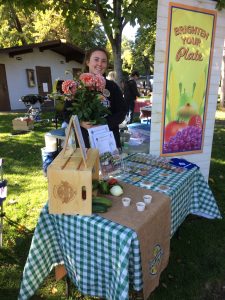By Kiara Kashuba
On a frosty morning in mid-October, City Park in The Dalles, Oregon, hums with activity as shoppers mosey about the final Farmers’ Market of the season. The air smells rich of soil clumps clinging to root vegetables, delicate baked treats, locally roasted coffee beans, and bouquets of freshly cut dahlias.
Eager to stock up on local produce, meats, cheeses, and other goods before winter sets in, families and neighbors meander about the market stalls, chatting with the region’s farmers and food processors. And it’s not just yuppie white yoga moms, either—The Dalles Farmers’ Market buzzes with a diversity not typically seen at farmers’ markets: people of all ages, sizes, colors, languages, and identities are present.
My booth is near the entrance of the Market. I am sampling a chilled couscous salad decorated with cucumbers, tomatoes, and peppers purchased from neighboring produce booths. Part of my position as Food Systems Coordinator with Oregon State University’s Wasco County Extension Service entails public nutrition education and outreach: today, I am offering folks an example of an easy, healthy, and SNAP (formerly known as Food Stamps) – budget friendly recipe that they could make with what they purchase at the market.
The Dalles is a tightknit rural community nestled on the Southern bank of the majestic Columbia River Gorge. The hills surrounding the largest town and county seat of Wasco County, Oregon, beam gold with ethereal wheat fields, and cherry orchards dot the landscape (if you’ve ever eaten a maraschino cherry, odds are it came from good ol’ Wasco County!). Yet in a land of such rich agricultural production, food insecurity (the limited or uncertain access to adequate, nutritious food) and diet-related disease affects an unjust percentage of the community. About one third of Wasco County is classified as food insecure, and 38% of children are overweight or obese. Learning hands-on about the intricacies of public health this year has been fascinating. The social determinants of health (academic jargon referring to the external environmental factors bestowed upon an individual at birth that affect one’s health, such as income inequality, access to healthcare and education, proximity to grocery stores, safety of neighborhoods, etc.…) are stacked against many residents in the area, by no fault of their own. But, in the face of adversity, the community of The Dalles truly defines itself by gritting its teeth and tirelessly working together to improve the quality of life for its citizens.
I observed this caring and can-do attitude when The Dalles Farmers’ Market Board (with a little help from ya girl) submitted a grant this winter to fund its first-ever SNAP-match program. If funded, low-income folks could use $10 of EBT funds at the Market and receive $10 in additional tokens to spend on food. Ensuring equitable access to fresh, healthy, and safe foods while supporting the local agricultural economy in the process is paramount to fostering a culture of well-being and resilience in our communities. I am honored to help make this objective a reality through projects like the SNAP-match grant, nutrition outreach, and others.
I chat with passerbys about budget, healthy recipe ideas as I slyly slip a small sample cup of couscous salad into their hands. Some are hesitant to try a new dish at first, but everyone seems to like it. There’s some Wow, this is healthy? But it tastes so good! and Where’s the recipe?! and a few I would totally make this for my family. Several people ask me when I’ll be back again, and even invite me over for dinner (granted I bring some couscous salad). A few mention that they suffer from a diet-related disease and are learning to cook healthier meals to manage it, so I hand them a free farmers’ market-focused cookbook and we go over some of the recipes together.
My time spent with RARE thus far has proven to be incredibly rewarding. Serving rural presents an unparalleled professional development opportunity, and I have no doubt I am positively impacting my community just as they are positively impacting me.
A bit about Kiara Kashuba:
- Currently serving as a Food Systems Coordinator with Oregon State University Extension Service – Wasco County
- Bachelor of Arts in Planning, Public Policy and Management with Minors in Food Studies and Environmental Studies, University of Oregon, June 2017
- People may be surprised… “that I almost went to art school.”
Does community development work interest you? Are you looking for a life changing experience in rural Oregon? Learn more about serving with the RARE AmeriCorps Program via our website: https://rare.uoregon.edu/application-process/member-application-process/
